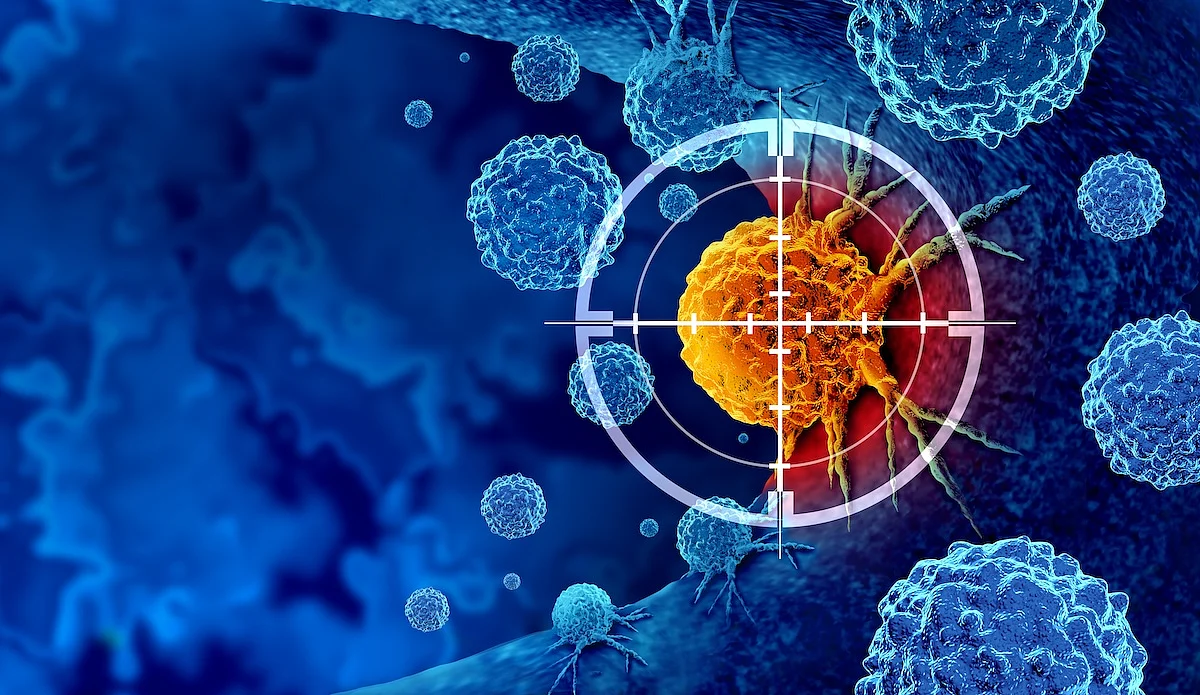Autoantibodies Influence Cancer Response To Immunotherapy, Study Says
By Dennis Thompson HealthDay Reporter
 via HealthDay
via HealthDayMONDAY, July 28, 2025 — Cutting-edge immunotherapy drugs are incredibly effective against some cancers but barely put a dent in others – and researchers might now know why.
Patients’ own autoantibodies – immune proteins traditionally associated with autoimmune diseases like psoriasis and lupus – appear to dramatically influence their individual response to immunotherapies, researchers report in the journal Nature.
“Our analysis shows that certain naturally occurring autoantibodies can tilt the odds dramatically toward shrinking tumors,” senior researcher Dr. Aaron Ring, chair of immunotherapy at Fred Hutchinson Cancer Center in Seattle, said in a news release.
“We saw some cases where autoantibodies boosted a patient’s likelihood of responding to checkpoint blockade by as much as five- to ten-fold,” he said.
The study focused on immune checkpoint inhibitors, drugs that boost the body’s ability to attack on cancer by removing cancer cells’ ability to evade detection by the immune system.
These drugs have transformed treatment for a wide range of cancers, including melanoma and certain types of lung cancer, researchers said in background notes. However, not all patients respond to the medications.
Researchers screened for more than 6,000 types of autoantibodies in blood samples taken from 374 cancer patients receiving checkpoint inhibitors and 131 healthy people.
“For years, autoantibodies were viewed mainly as bad actors in autoimmune disease, but we’re discovering they can also act as potent, built-in therapeutics,” Ring said. “My lab is mapping this hidden pharmacology so we can turn these natural molecules into new treatments for cancer and other illnesses.”
Results showed that cancer patients had substantially higher levels of autoantibodies compared to healthy folks.
Importantly, certain autoantibodies were linked to better outcomes among cancer patients, researchers said.
For example, autoantibodies that blocked an immune signal called interferon were linked to better tumor attacks by checkpoint inhibitors.
This finding mirrors other studies, which have found that too much interferon can exhaust the immune system, limiting the effects of immunotherapy, researchers said.
“In some patients, their immune system essentially brewed its own companion drug,” Ring said. “Their autoantibodies neutralized interferon and that amplified the effect of checkpoint blockade. This finding gives us a clear blueprint for combination therapies that intentionally modulate the interferon pathway for everyone else.”
However, not all autoantibodies helped cancer patients. Several were associated with worse outcomes, likely because they disrupted critical immune system pathways necessary to combat cancer, researchers said.
Finding ways to eliminate or counteract those autoantibodies might improve the effectiveness of immunotherapy in patients who otherwise might not benefit, researchers said.
“This is only the beginning,” Ring said. “We’re now extending the search to other cancers and treatments so we can harness — or bypass — autoantibodies to make immunotherapy work for far more patients.”
Sources
Disclaimer: Statistical data in medical articles provide general trends and do not pertain to individuals. Individual factors can vary greatly. Always seek personalized medical advice for individual healthcare decisions.
Source: HealthDay
Posted : 2025-07-29 00:00
Read more

- Garetosmab Biologics License Application Accepted for FDA Priority Review for the Treatment of Fibrodysplasia Ossificans Progressiva (FOP)
- Gap In Preventable Deaths Widening Between Those With, Without A College Degree
- Nearly 6 In 10 Women Expected To Develop Heart Disease
- Placental Vascular Reactivity Can Help ID Fetal Congenital Heart Disease
- FDA Expands Tater Tot Recall Tied to Possible Plastic Contamination
- Stable, Supportive Shoes No Aid for Hip Osteoarthritis
Disclaimer
Every effort has been made to ensure that the information provided by Drugslib.com is accurate, up-to-date, and complete, but no guarantee is made to that effect. Drug information contained herein may be time sensitive. Drugslib.com information has been compiled for use by healthcare practitioners and consumers in the United States and therefore Drugslib.com does not warrant that uses outside of the United States are appropriate, unless specifically indicated otherwise. Drugslib.com's drug information does not endorse drugs, diagnose patients or recommend therapy. Drugslib.com's drug information is an informational resource designed to assist licensed healthcare practitioners in caring for their patients and/or to serve consumers viewing this service as a supplement to, and not a substitute for, the expertise, skill, knowledge and judgment of healthcare practitioners.
The absence of a warning for a given drug or drug combination in no way should be construed to indicate that the drug or drug combination is safe, effective or appropriate for any given patient. Drugslib.com does not assume any responsibility for any aspect of healthcare administered with the aid of information Drugslib.com provides. The information contained herein is not intended to cover all possible uses, directions, precautions, warnings, drug interactions, allergic reactions, or adverse effects. If you have questions about the drugs you are taking, check with your doctor, nurse or pharmacist.
Popular Keywords
- metformin obat apa
- alahan panjang
- glimepiride obat apa
- takikardia adalah
- erau ernie
- pradiabetes
- besar88
- atrofi adalah
- kutu anjing
- trakeostomi
- mayzent pi
- enbrel auto injector not working
- enbrel interactions
- lenvima life expectancy
- leqvio pi
- what is lenvima
- lenvima pi
- empagliflozin-linagliptin
- encourage foundation for enbrel
- qulipta drug interactions
